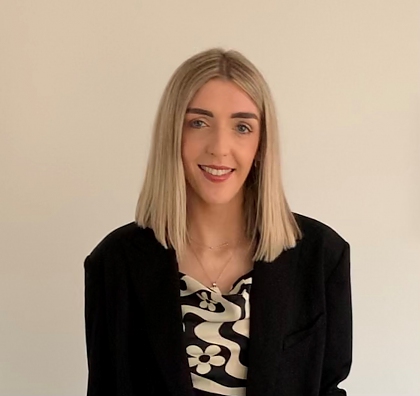Emma
Adaptability and flexibility, communication, and confidence
Tell us a bit about yourself and what you are doing now.
Hi! My name is Emma and I currently live in Manchester. After finishing my undergraduate course, I really wanted to gain more experience within the sector and after a lot of research and volunteering, I decided to study a Master’s. I studied my postgraduate degree in Arts Management, Policy and Practice between September 2019 and September 2020. I now work for Arts Council England as a Communication Officer for the National Advocacy and Communication Team. I am responsible for our internal communication, so my role is about telling everyone who works for the Arts Council, what is going on – like an internal journalist for the whole organisation!
How are adaptability and flexibility, communication, and confidence important in your current role?
In my current role, every day can be different. Although I have key responsibilities such as weekly newsletters, we also have a range of projects and funds, internal changes and key messages that need to be communicated. They all have varied timelines, and things can change some and the team need to be super flexible and adapt to any situation.
I am a Communication Officer so communication is a big part of my role! I am constantly working with the wider communications team, as well as colleagues across the Arts Council, to deliver important messages in the most effective way. I must have the confidence to prioritise messages, reach out to colleagues to get more information and challenge things when necessary. Sometimes this communication may be to colleagues I have not worked with before, so it is important that I am clear with what I want to say and communicate professionally.
How did you develop each of these skills during your degree?
During my Master’s, I developed numerous skills, but my adaptability and flexibility definitely evolved when the Covid-19 pandemic hit. During that time, the delivery of my course changed, and I had to adapt to the unique and unsettling experience. I had to be resilient in the face of continually changing circumstances – lots of problem solving!
I also developed my confidence and communication skills virtually which I use now in my role daily. Instead of quickly asking a question in a seminar, I had to email. I learnt how important it was to be straight to the point and became more confident in my own writing style.
How did these skills help you get your first graduate job?
I had to be flexible in response to the changing job market when I graduated. It was important that I communicated how I found my experience and how it had made me more resilient. Plus, I had to believe in myself and my skillset. I had to have confidence! Looking for a role can be challenging, but it is important to remember everyone is on their own path and things do take time.
What were the main factors that influenced your choice of first graduate job?
When I started looking for a graduate job, I began looking in the arts and culture sector. I did not find anything that was right and things I did apply asked for more experience. Therefore, I decided to think strategically and asked myself, 'what skills and experience do I need to get to allow me to get to where I want to go?'. I was super interested in engagement, communication, and gaining experience in an office-based job, which I had not done before. When the role of Student Engagement Assistant came up at The University of Manchester through Manchester Graduate Talent, it seemed like the right fit. It was an opportunity for me to gain a range of skills, develop my confidence, and get my first ‘real job!’ All the skills I learnt whilst working for the University definitely helped me get my current role at the Arts Council. It was an opportunity for me to combine my academic studying with my professional work experience, and my interest in the arts!

